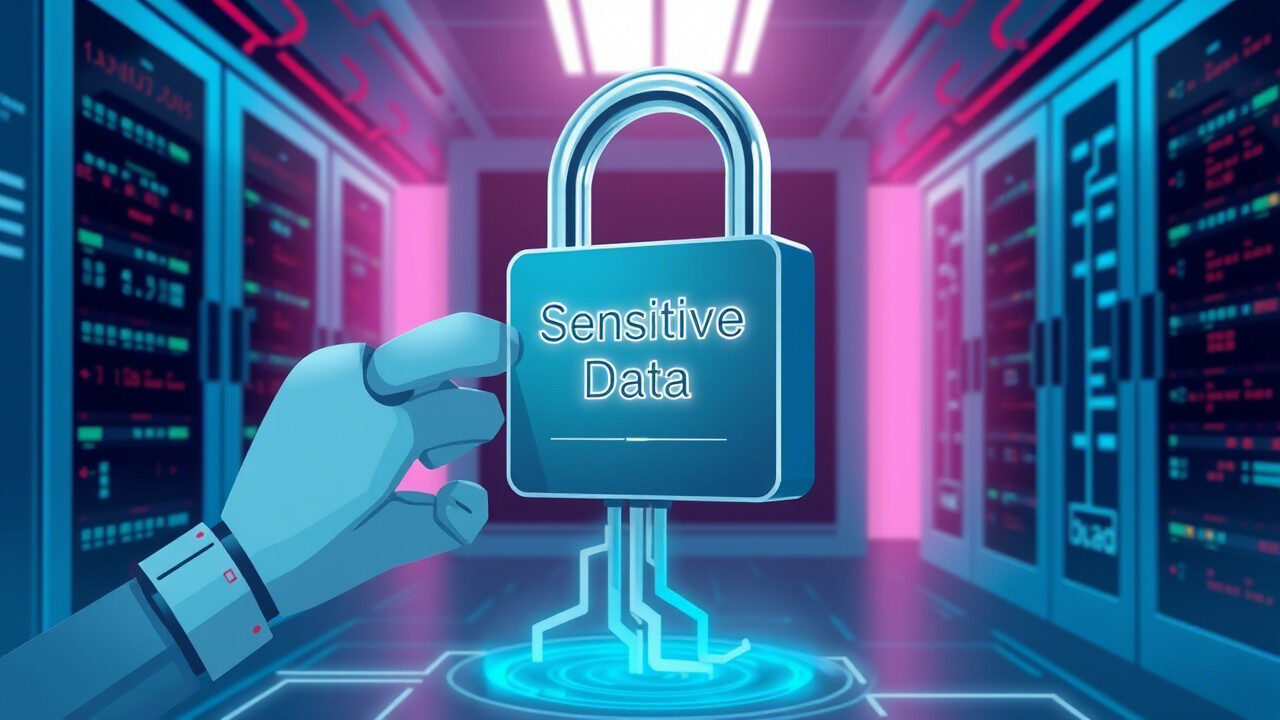The emergence of tools such as GitHub Copilot has changed the way developers work, ushering in intelligent code suggestions to hasten and improve productivity. With an increase in the capabilities of these tools, however, also comes concern regarding what sensitive information might be stocked in their training data. Given data training context, it is important to understand how this happens and what one might do to safeguard sensitive data against exposure.

In this exhaustive walk-through guide, we will have a look-see into possible reasons that might explain the propensity of Copilot to store sensitive information, alongside recommendations for protecting training data in keeping with ethical AI. Let’s dive into how you can take control of your sensitive data and ensure a secure AI development environment.
Why Does Copilot Store Sensitive Information in Its Training Data?
Evidently, AI models have certain basics which need to be known to understand how sensitive information can leak into such training data for Copilot. Like other AI-based tools, Copilot is trained on a vast amount of public code and data-including host open-source repositories, forums, and other resources accessible for coding.
But then, the inherent risk of having sensitive data, such as a private key, password or proprietary code, could accidentally find its way into public datasets and be inadvertently learned by AI models.
Key Factors Contributing to Sensitive Data Storage:
- Unintentional Data Inclusion: AI models can inadvertently learn sensitive information from open-source code if it isn’t properly sanitized.
- Lack of Data Anonymization: In some cases, data anonymization techniques might not be applied, which means private information gets included in training datasets.
- Data Retention Practices: If AI models retain large datasets without proper controls, they might store sensitive or proprietary data from their interactions with developers.
Step 1: Implement Proper Data Anonymization
The foremost measure against the storage of sensitive information within training data is employing data anonymization techniques focusing on individuals. Anonymization makes sure that any personal and sensitive data is either hidden or cleansed entirely once it enters the training processes.
Why Data Anonymization Is Important:
AI Ethics: Anonymizing data protects the models from processing private or confidential data while respecting privacy.
Regulatory Compliance: Anonymizing data is one of the fundamental parts of GDPR and other data privacy legislation because it dictates that the information in the possession of people should be protected.
How to Apply Lee Data Anonymization:
Obfuscate PII: Replace the sensitive information such as names, email accounts, or company identifiers with a generic placeholder.
Use Synthetic Data: Create synthetic data with a structure equivalent to real data or mimic actual behaviors without disclosing any genuine confidential information.
Redaction of Sensitive Code: Train datasets should not contain code snippets or repository logic using sensitive credentials or personal information.
Action Tip: Leverage open-source data anonymization tools like Synthea or Faker to ensure that sensitive information is not included in training sets.
Step 2: Review Data Retention Practices
The most usual reasoning behind an AI model retaining sensitive data is lapses in data retention practices. If sensitive data is kept for longer periods or not removed properly from the models after training, then perhaps that data remains accessible for longer.
Importance of Data Retention:
Data Minimization: According to AI ethics and privacy laws, an organization must retain the data only for a legitimate purpose for which it is needed.
Risk Mitigation: The longer the sensitive data is retained, the bigger the chances of unauthorized access, data breach, or misuse.
How to Enhance Data Retention:
Enforcing Data Deletion Protocols: Upon concluding the training, any set of sensitive data or PII must be deleted from the model and dataset.
Rights over Data Access: Training data access should be limited to selected representatives so that only authorized personnel may interact with sensitive information.
Regular Audits: Perform audits on your training datasets at intervals to identify sensitive information that may have been included without the intent.
Action Tip: Automate data retention policies using tools like AWS S3 Lifecycle Policies or Google Cloud Data Loss Prevention to ensure data is appropriately handled.
Step 3: Adopt Privacy-First AI Development Practices
It is also incorporated within the AI life cycle, thus upholding AI ethics during the entire training or data processing stage. All this development is ‘privacy first,’ wherein privacy is to be built into the very life-cycle of development-even not as an afterthought-to the model.
Why Developing for Privacy is so Important:
AI Ethics for Systematic-Relevant AI Systems: Given the fact that privacy and confidentiality were built into AI systems, ethical development of AI very much rests on the demanding ethics of such applications.
Trust and Transparency: Privacy-first AI developments create trust among the stakeholders- regulatory agencies, customers with the same philosophy, all around privacy-first.
How to Adopt Privacy-First Practices:
Embracing Privacy-First Processes: Data Amnesty: Inform what data is being collected and how it would be used such that informed consent is given whenever needed.
Minimum amount of Data Use: Data can only be used for that which is strictly needed for training and avoidance of use of given personal or sensitive information unless there is a complete emergency.
Privacy by Design: Privacy has to be at every consequential step in its AI life cycle-from design and development to deployment and continued maintenance.
Action Tip: Use frameworks like Fairness Flow or AI Fairness 360 to ensure privacy and fairness are prioritized throughout your development process.
Step 4: Regularly Test and Monitor Model Outputs
In view of suitable practices in data anonymization and retention, there is also the need to constantly scrutinize the outcomes of AI models to identify any unintended storage of sensitive information or bias in AI responses.
The Importance of Monitoring:
Unintended Data Leakage: Sensitive information may be incidentally leaked out of the well-performing models, and unless they are very carefully monitored, bias in response to AI may be noticed.
Continued Improvement: A continuous series of testing and revisions of the model ensures respect for ethical standards and a greater guarantee against any violations of privacy.
How To Monitor AI Output
Monitoring Should Be Automated: Creation of comprehensive automated systems permitting tracking and output logging in AI models is critical to fast spotting instances of data leakage or unethical behavior.
Alerts Should Be Set Up: Setting up alert systems to inform when a model outputs potentially sensitive or personally identifiable information can be very useful.
Agile Testing On A Regular Basis: Regularized test running for ensuring AI models conform with privacy law and also to ensure that no disclosure of sensitive information takes place inadvertently.
Action Tip: Utilize Google’s AI Platform Monitoring or IBM Watson OpenScale to monitor AI model outputs for compliance and data security.
Step 5: Stay Updated on AI Ethics and Privacy Regulations
AI privacy laws and ethical protocols never remain stationary; they rather continuously evolve. This is why any update regarding changes in regulation, for instance, GDPR or new ethical standards on AI, becomes a must to assure continued compliance and data privacy.
The Need for Updates:
Regulatory Compliance: As data privacy laws evolve, so must your ways of protecting data.
Building Trust and Holding Accountability: Keeping abreast with the ethical standards assures the users respect for their privacy.
Ways of Staying Updated:
Follow Industry News: Follow industry blogs, legal journals, and AI ethics conferences to stay abreast of developments in AI ethics and privacy laws.
Engage with AI Ethics Groups: Join Sanctuary Partners for AI or The AI Now Institute to stay ahead of upcoming standards.
Consult with Legal Experts: Employ legal practitioners to keep assimilation of the latest regulations and ethical guidelines within your AI model.
Action Tip: Subscribe to resources like AI Now or The Electronic Frontier Foundation (EFF) for the latest updates on AI ethics and data privacy laws.
Final Thoughts: Ensuring Secure AI Development

There is a need for a comprehensive ethical approach toward addressing concerns regarding sensitive information contained in training data. From anonymizing the data to adopting privacy-centric AI development practices, and remaining updated on trends in AI ethics, all this approaches should help in entrenching your data in safety and overall trust among users.
Why TechNow Is the suitable IT Support Service Agency in Germany
Your suitable IT support service agency in Germany, TechNow, specializes in helping businesses tackle issues related to AI ethics, data privacy, and compliance with the GDPR. An expert in tailoring IT solutions, TechNow guarantees that all your AI models, such as Copilot, are developed and operated in a privacy-secure way. Whether you need advice on how to anonymize your data, monitor your AI models, or ensure ethical development, TechNow is always by your side with IT support.



